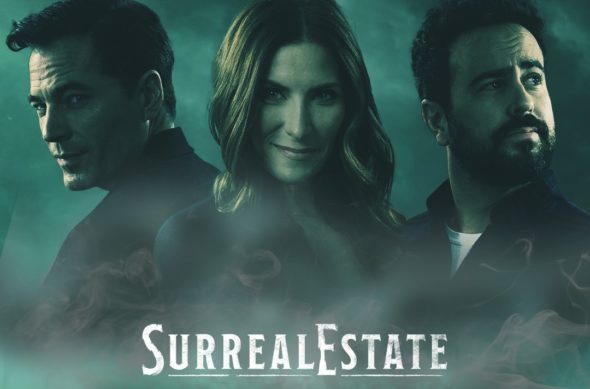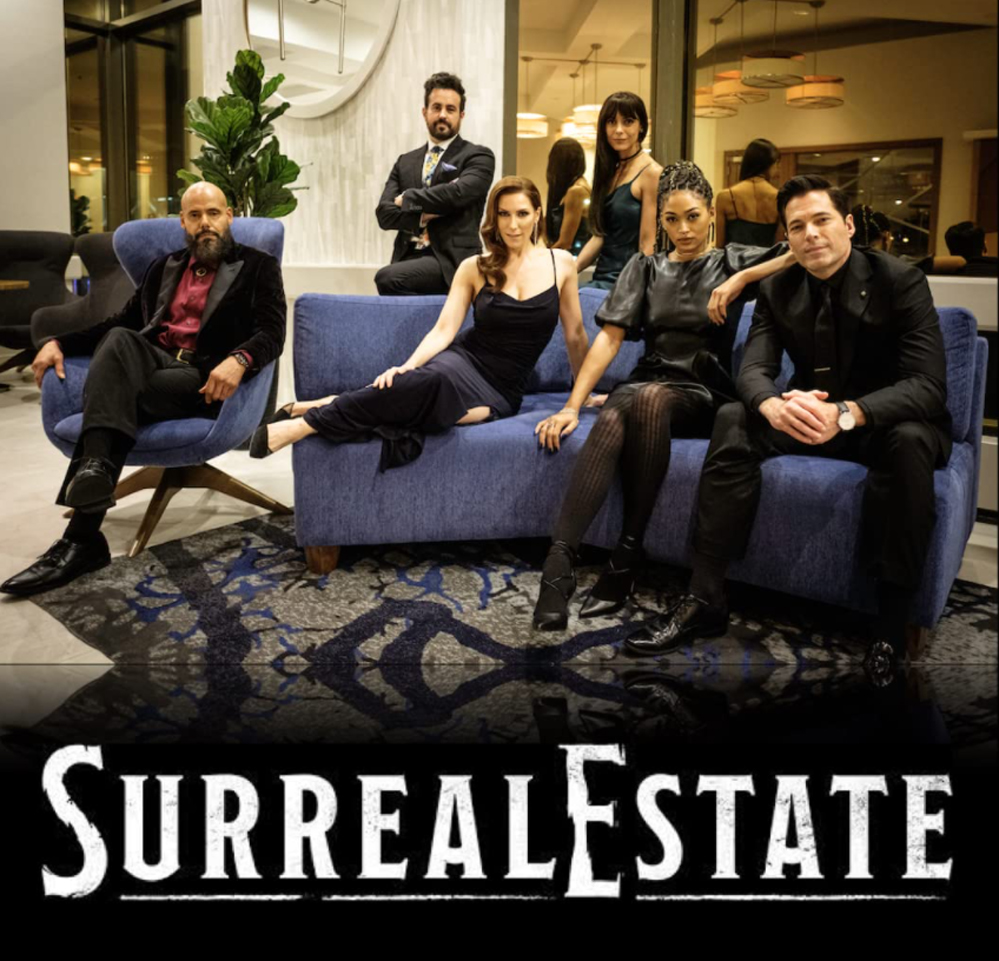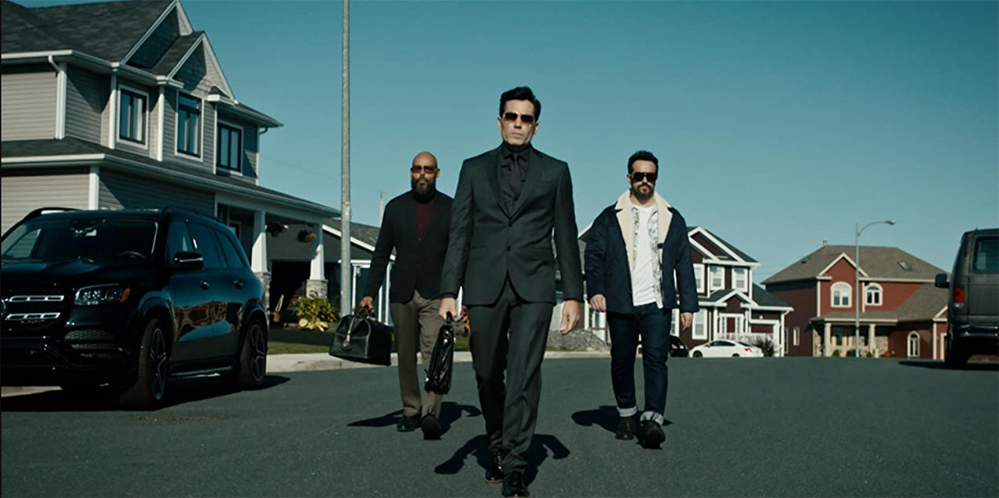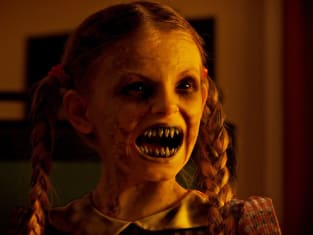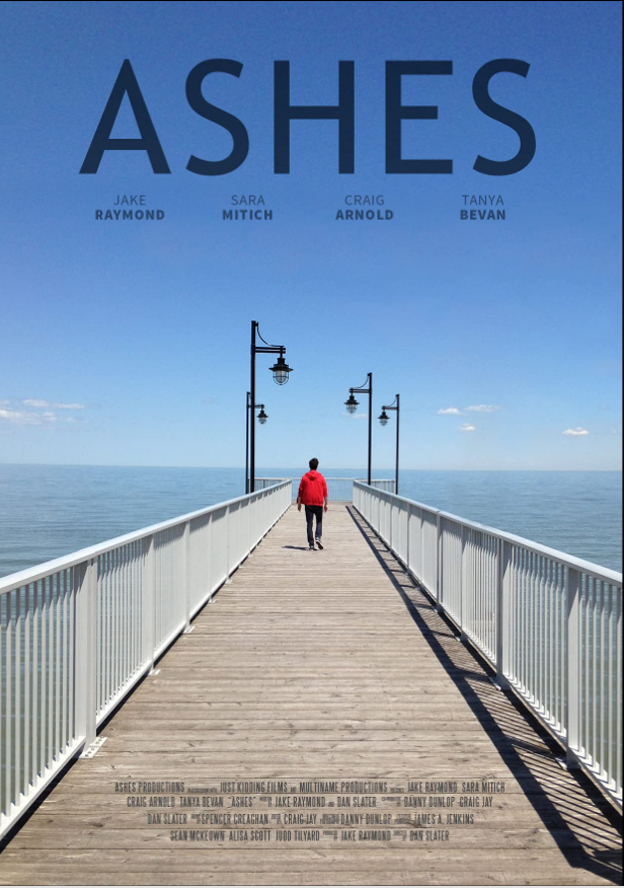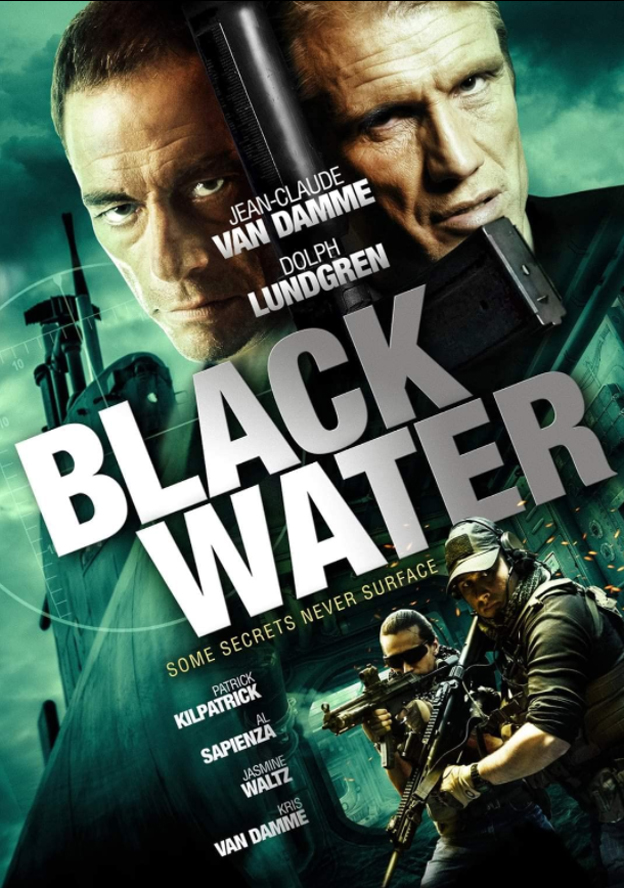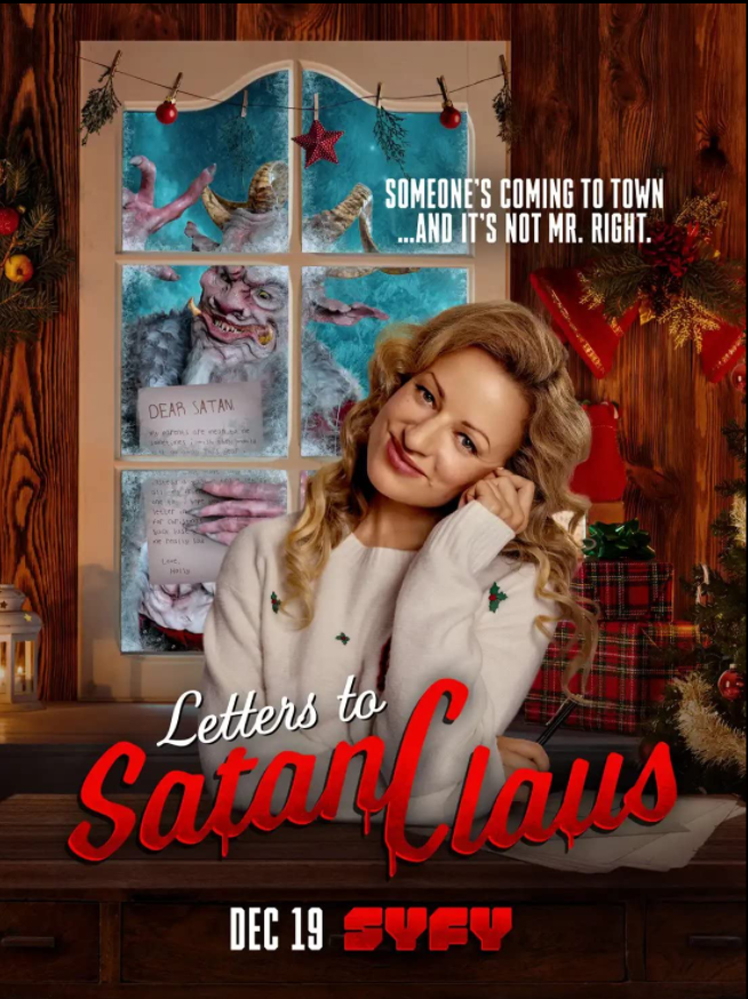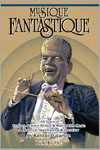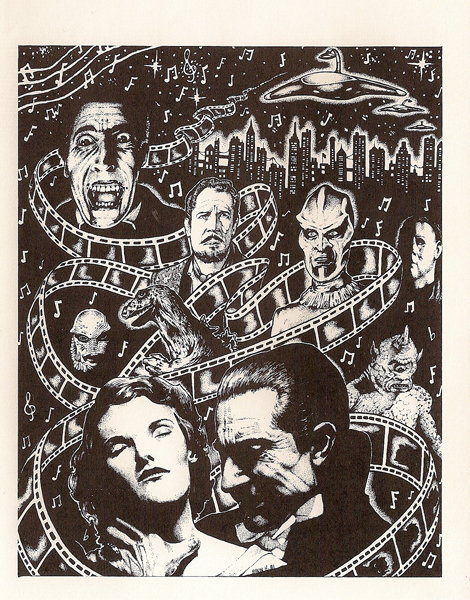August 14, 2021
The Surreal Musicality of Spencer Creaghan
Interview by Randall D. Larson
Spencer Creaghan is a Multi-SOCAN-Award-winning and JUNO nominated film & modern media composer. An alumni of the Canadian Film Centre’s prestigious Slaight Family Music Lab, he has written music for over 100 films of feature and short length, along with plays, . webseries, advertisements, bumper logos, video games, and a children’s Theme Park. He is most known for the hit Canadian webseries’ TEENAGERS AND ALL FOR ONE; the Jean-Claude Van Damme & Dolph Lundgren action thriller BLACK WATER; and the SYFY Christmas horror comedy LETTERS TO SATAN CLAUS. His music has been heard in festivals around the globe, including TIFF’s Canada Top 10, Cannes Film Festival, and the Sundance Film Festival. When not composing commissioned work, Spencer writes music of various styles including pop, rock, hip-hop, musical theatre, and metal. Creaghan was mentored by acclaimed Canadian composer Lesley Barber.
Recently, Spencer completed scoring the SYFY supernatural series SURREALESTATE. This show is an effective mix of comedy and spookery with a lot of heart in which realtor Nick Roman and an elite team of specialists handle the cases that no one else can: haunted and possessed houses that literally scare would-be buyers away. These houses are home to all manner of supernatural squatters, the kind that just won’t be evicted without an exorcism. The Roman Agency specializes in selling the so-called “stigmatized” properties that others can’t. And right now, the doom business is booming. The show, starring Tim Rozon, Sarah Levy, Adam Korsoy, Maurice Dean Wint, Savannah Basley, and Tennille Read, premiered July 16th, 2021, which we discuss at length below. -rdl
Q: What initially turned you on about film music and how did you find a place in the world of film scoring?
Spencer Creaghan: My journey with film music was an interesting one. I actually wanted to be in the film industry since I can remember, and I always thought that would be as a writer or a director. Around the age of 15 I discovered a genre called symphonic metal, a blend of heavy metal with big orchestras – I’d always been listening to movie soundtracks, but that really escalated my love of cinematic and orchestral music, specifically narrative music. People mentioned things like “Your music sounds like film music,” and I kept thinking, well, I’m good at this, apparently, and I have a deep love of writing and directing in film anyway, so let’s just do that but in music. It just spun up from there. I studied at a University that had a music and a film program in the same building, and that allowed me to meet filmmakers and begin working from the age of 19. And it’s been, basically, ten years on, and I’m still here and I’m still writing and I’m having a blast.
Q: When you were starting out, like many new composers do, you scored a number of short films in the 2012s through 2016s. What did these you learn from these experiences as you honed your skill as a media composer?
Spencer Creaghan: Oh, man, I think we would be here for days if I were to list each lesson learned! One thing that I loved about working with every one of these directors was that it helped me understand what my voice was and what I liked to bring out in music. I’ve learned that I’m very much the kind of composer who loves bringing out a sense of world-building within the music itself. Working with many directors I’ve learned that music can become its own existence, along with the acting and the filmmaking, but it never overshadows any one element. It works complementary with the filmmaking, and that’s something that took me basically up until almost until now to really hone in on. That was something that I think working on all these shorts has helped to evolve and develop.
Q: You’ve just scored the SYFY series SURREALESTATE. When you came on board this project, what were the discussions you had with the director/producers on the kind of music they were looking for?
Spencer Creaghan: We talked a lot about how melodic themes aren’t as prevalently used in today’s TV as any one of us all would like. We spoke a lot about using themes to help bring out the heart in the story, as this is a pretty emotionally challenging TV show to work on. We have the horror, we have the comedy, we have the heart moments, we have the drama, and we have a little bit of romance as well. Balancing all of those tones with a different house every week, which also needs its own musical palette, allowed us to play up musical themes in ways that would create a roadmap and a musical world which we can always come back to while we’re jumping between horror and comedy and drama, allowing these motifs to keep us grounded. I remember George Olson, the show’s creator and showrunner, very early on mentioning that he wanted the music to almost have an ancient quality, and so we turned to folk instruments and choirs to help us get there.
Watch the trailer for SURREALESTATE:
Q: Each episode of the series is centered around the showing of a different haunted house to a potential buyer. How have you varied the tone throughout each of the episodes?
Spencer Creaghan: One thing I loved about working with George and director Danishka Esterhazy was they both have such encyclopedic minds to think of stories and other films. We were always referring back to ancient stories – like in episode two there’s a child character named Cindy and we really wanted that to have an old monster/witch vibe that would almost feel a bit Hansel and Gretel. In episode four, there were a bunch of sailors and with the music we wanted to have it feel as if we were in a scary boat, so we used fog horns and ship bells to help us get there. There’s an episode later on which uses grandfather clocks and another which uses a child’s play toys, because we always wanted to find something that made each of these hauntings unique in their own world. The variety and freedom to look beyond just the usual musical instruments allowed us to come up with solutions which kept the episodes musically exciting. In my original pitch I used door knocks and doorbells and creaking, and we ended up using those as well in later episodes, also hitting windows and bathtubs with mallets, using sounds of forks and knives, and finding ways how we can play these non-musical instruments to make them sound like music in each of the houses. It was a challenge, but I’ve been really excited about it and I think the audiences are as well.
Q: How did you create your instrumental palette for this series?
Spencer Creaghan: That was a long work over the first couple of episodes, trying to figure out how to balance each of the tones. We knew that we wanted orchestra, we knew that we wanted choir, and we knew that we wanted electronics, and it wasn’t really until I saw the first dailies and how beautiful the Newfoundland landscapes were that I realized Irish instruments were something we really needed to lean on, because the landscapes are so majestic and hauntingly beautiful, and Irish instruments have a very similar quality of ethereal hauntingness, as well as a sense of real world groundedness, and a load of history. So once we figured out that we could use folk instruments to help play-up the odd parts, the comedy, and even in some areas the horror, allowed us to use the orchestra in more of the cinematic moments, choir in horrific and family moments, and the electronics in the real-world moments. That allowed us to mix-and-match and really blend styles. Also by blending all of these instrumentations together with the found sounds, it made a palette that I think none of us expected but we’re all very pleased with.
Q: Were you able to use live instruments or were you mainly using digital samples?
Spencer Creaghan: We mostly stayed within the box. That was due to the pandemic, but we did have live drums, live vocals, and live guitars on many episodes. But although we were stuck with sampled orchestras and choirs, I don’t think anyone would notice listening to the music – I believe that the music is extremely rich despite being all within the box. It has a very lifelike, organic quality and I believe a lot of that is just due to how the music has been produced. Thankfully there are many great sample libraries, and I’ve had enough experience working with them that I’m proud to say that I am quite good at making samples sound realistic. Technology mixed with a lot of experience working with these samples has led to a pretty lifelike score.
Q: Would you describe your thematic configuration of your score?
Spencer Creaghan: A lot of the musical themes are less character themes and more conceptual themes. That was a decision that we made pretty early on because we knew that there were a lot of subtexts running around George’s scripts that we didn’t want to leave hanging, and so most of the themes – I’d say almost all of them – are themes of family, of investigation, of hope, or of crummy clients! There’s one theme that comes back in almost every episode which we call the “ethereal plain.” We first hear that when Luke and Susan are speaking at the batting cages in episode one, and there was a real sense in that moment that Luke is bringing Susan into his ethereal plain, into his kind of magical world almost as if he is the Obi-Wan to Susan’s Luke Skywalker! And we really wanted to bring out these ideas in the music, as much from the spiritual world as the physical, and I think by focusing on this type of thematic palette allowed the score to be another character. It never steps over the actors but exists alongside them.
Q: This is probably the most overtly horror-type film you’ve scored thus far – how far do you go in terms of scare, in terms of darkness, and in terms of dealing with – or not dealing with – the comedy of the story?
Spencer Creaghan: The comedy was something that we didn’t want to lose. Even when dealing with the scarier moments, George’s scripts have comedy all over the place. So even when we were focusing on action and horror moments we knew that we had to also play up the comedy elements as well. That’s where we really leaned in on the folk instruments and even instruments like the Theremin to help those come alive. However, when it came to the horror, we did embrace that as well. We really hit these scares as hard as anything else, although we didn’t want to use elements that we felt were a bit overused these days. So even when it came to the jump scares, I didn’t use many low booms but we did use a lot of shrieking sounds – like a metal blade on the chalkboard – and each of those moments would be preceded by these low, almost arrhythmic pulses. These pulses would not come in when you expected them to, but they would always exist creating tension – then when the scare arises we hit with a nice pluck on a harp and a shrieking choir and like a stabby string. We felt that was more effective than a low boom or a big whack, especially when preceded by almost invisible tension that just gets right inside of your gut. We really kept away from rising strings because we felt that was over anticipating a moment, while holding those back and letting music exist almost as if it’s something you can’t tell is there but it is affecting you very deeply. That created a more impactful scare.
Q: You were one of several composers to score SAMANTHOLOGY (2019), an intriguing anthology drama of nine stories each about a person impacted by the death of this woman, Samantha. What can you tell us about scoring some of these episodes?
Spencer Creaghan: That was a great little one. I’d attended the Canadian Film Centre and The Slaight Family Music Lab, and all of the composers were in the same year; the producers wanted us to collaborate, so we each took one short. We discussed between each other about what each episode would sound like and then we found tiny musical motifs that we could be playing within each one to tell a larger story. I’m very blessed to still be working with all of these composers, and Chris Reinick, who was a part of that process, has also been working with me on drums and percussion and music editing.
Q: The films ASHES (2017) and GOLIATH (2019) also had to do with reactions to death. How did you approach scoring these projects and dealing with their emotive subject matter?
Spencer Creaghan: Each one was quite different. ASHES was playing up the idea of trying to find something within the movie which is integral to the story but might not be specifically represented. That character revolves around his parents passing away and the scattering of their ashes. We thought it was interesting how the movie never really gives us a moment of what the protagonist’s relationship with his parents might have been like, and we felt that’s where the music might help with that. We came up with the idea of: what if the score was his mother, kind of helping him along, saying this is ok, this is part of it, you’re going to do good, remember us, and it’s ok when you need to move on. My director loved that idea so I just ran with it. I think it created a very intimate score that captured the character’s memory as much as his physical journey.
GOLIATH is about one woman’s battle with bi-polar and the death of her father, and we felt that the music should be something that could play up these elements and help us to connect with her on a similar brainwave. A lot of that music, while it doesn’t go into extremes, does bring us into what it might feel like to have this illness. My director was very incredible, guiding my hand along with these experiences and how we can understand them, and the actress did a phenomenal job. I wrote the ending of the film first, which is a very powerful scene, and ironically that piece of music in its entirety didn’t fit anywhere else in the movie, but its melodic content did, so much of that film is slowly introducing this little melodic fragment which evolves into the quite emotive, luscious piece at the end of the film. Our character doesn’t want to accept that her father is really gone, and I think in a lot of that movie she’s battling with how she connects with her family, and this little musical riff plays with that interpersonal battle. Then we felt that her release at the end of the film was much more earned, having had these little melodic moments carrying us with her journey.
Q: In 2018 you scored Pasha Patriki’s action thriller BLACK WATER, starring Jean Claude Van Damme and Dolph Lungren. What were your challenges and opportunities in scoring this film?
Spencer Creaghan: That film was one that I didn’t think I was going to get because I pitched with heavy metal. That’s one of the chief things that most directors will say, “Oh, no no no, we don’t want that!” However, I felt it was the right direction for this movie. I’m a pretty big metal guy and thankfully Pasha is as well, and we were able to lay up these metal riffs to really bring up the bad ass-ness within the characters. I kept thinking I wanted a score that sounded as if Jerry Goldsmith scored with Meshuggah, and what would that sound like?! But I also loved bringing in sounds that exist within the world of the story. The vast majority of the movie takes place on a submarine, and I kept thinking what it would sound like if the orchestra replicated an underwater radar or like the creaking of water against steel. A lot of the score was to figure out how can we make the score sound like it is the submarine as much as it is the action and the drama. Can we bring the sub alive in the music? I’m always trying to do those sorts of things and I think I brought along that same idea with me to SURREALESTATE as we’re trying to also bring alive these houses, or in ASHES where we’re trying to bring alive the mother’s memory, or in GOLIATH where we’re trying to bring out a mental health concern which is not often talked about and how we should represent that. BLACK WATER was a fun one and I think we did a pretty good job. I’ve gotten some really nice complements on the music, and I would love to do something like that again.
Metal is deeply rooted in, I think, almost every one of my scores, even ASHES with the guitars. I knew that there was something about the deepness of those tunings that would bring out a darker quality on Liam’s journey, especially if they weren’t distorted. And it worked great. Even on my initial pitch for SURREALESTATE – although there weren’t many guitars on it, my original pitch was very metal inspired. George loved that idea, so most of the action scenes use a lot of very metal-inspired rhythms that are very quick and very heavy, and very much within my passion.
Q: Last year you scored the parody horror series LETTERS TO SATAN CLAUS. What can you tell me about scoring this show and how you complemented its supernatural, scary, and comedic components?
Spencer Creaghan: LETTERS TO SATAN CLAUS was such a blast to work on because we knew that we wanted to lean in heavily to the Hallmark style. We thought that it would be great to take Christmas melodies and turn them into monster themes and horror moments, but also use instrumentation that’s only used in Hallmark movies. So we used plucky strings and we used chimes and bells and a festive choir going “bum-ba-bom-bu-bom-bom-bom!” We used all of that but then we’d also go into horror – and it was how do we turn those elements into something really scary? That was a bit of a challenge, but once the palette was found and the angle was established it all came together really nicely. My initial pitch on that movie was a kind of Mariah Carey-esque Christmas song that slowly gets evil over time, and they loved it. Even the lyrics are very 18-A/R-rated Christmas inuendoes! And we just kept leveling them up every single pass. Once that was it, we’d go as extreme as we needed into the Christmas [spirit], because we knew that the horror would nicely follow along with it. I’m really proud of that score. I worked with the same production company that was on SURREALESTATE and I love these guys. Armand Leo, Samantha Levine, they’ve just been really welcoming to bold ideas and big melodic scores. I remember there was a scene early on in the movie where I did one pass of the music, and Sam, our producer, said “This is great, Spence, but can we just knock it up like ten times? If you can do that I think you would make this scene great!” And I said, “Are you sure? I don’t want to overstep anything.” And she said, “No, no! Give us all of it!” I love doing that naturally, and so working with producers that want that as well has been such a blast and I hope to work with them again. All the Blu Ice Pictures people are very lovely and they make the type of movies I love working on.
Q: What do you have coming up next that you can talk about?
Spencer Creaghan: Right after finishing up SURREALESTATE I went into a film called QUICKENING, which is a very personal and poignant look at one woman’s journey into adolescence and pregnancy. It was directed by filmmaker Haya Waseem, and we’re very excited that it will have its world premiere at the Toronto Film Festival in September. The music is unlike anything I’ve done in the past – it’s very inspired by French impressionism like Debussy and Maurice Ravel. I think it’s Haya’s best work to date and I’m very proud to be part of that team. That’s a movie that I think people are going to connect with.
Q: Are any of your scores available on soundtrack albums?
Spencer Creaghan: We have the scores to ASHES, BLACK WATER, and a few other ones on my Spotify page (see here). We’re currently working on more and if that happens I’ll be tweeting about that. I’m very active on twitter and Instagram, talking about the scores of all my projects!
Thanks to Spencer Creaghan for taking the time to discuss his film music with me in detail – and special thanks to Elyssa Ruiz and Margot Nissenblatt of Impact24 PR for facilitating this interview.
You can find Spencer on twitter and Instagram as @SpencerComposer. His music can be found on all musical platforms at Spencer Creaghan or go to his website www.spencercreaghan.com.



